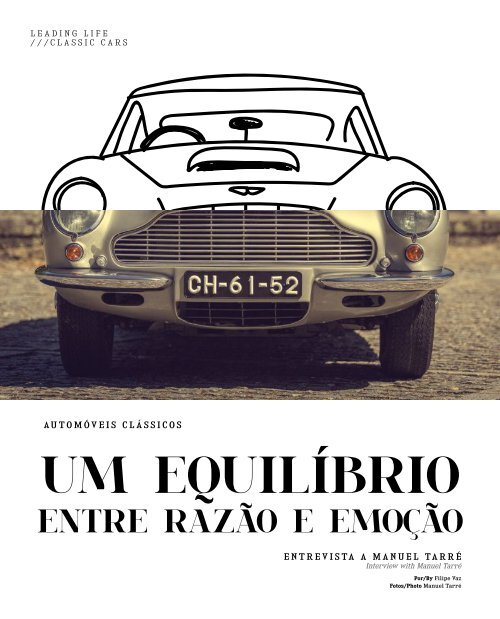Revista Líder – Setembro(2017) Nº1 Pago
You also want an ePaper? Increase the reach of your titles
YUMPU automatically turns print PDFs into web optimized ePapers that Google loves.
LEADING LIFE<br />
///CLASSIC CARS<br />
“Quando se conduz um clássico, é a imperfeição<br />
que nos dá prazer”<br />
“What I like about classic cars is the imperfection that gives us pleasure”<br />
Automóveis clássicos<br />
UM EQUILÍBRIO<br />
ENTRE RAZÃO E EMOÇÃO<br />
Entrevista a Manuel Tarré<br />
Interview with Manuel Tarré<br />
Por/By Filipe Vaz<br />
Fotos/Photo Manuel Tarré<br />
Comprar um automóvel clássico é um processo de emoções<br />
e tal como nas relações humanas, muitas vezes a emoção<br />
prevalece sobre a razão.<br />
Falámos com um dos principais colecionadores de automóveis<br />
antigos em Portugal que, simultaneamente, lidera uma<br />
grande empresa. Manuel Tarré é Presidente do Conselho de<br />
Administração da Gelpeixe, empresa emblemática no mundo<br />
dos congelados, que tem 170 trabalhadores, fatura 53 milhões<br />
de euros por ano e nos últimos cinco anos registou crescimento<br />
de exportações a dois dígitos, para além disso, é apaixonado por<br />
automóveis antigos.<br />
<strong>Líder</strong> (L): Qual foi o seu primeiro automóvel clássico?<br />
Manuel Tarré (MT): Foi um Mercedes 350SL de 1971, que adquiri<br />
em 1985 a um amigo. Um carro muito apreciado na altura<br />
porque era o carro de um dos protagonistas da série Dallas.<br />
Estava bem longe nesses anos de prever que algum dia poderia<br />
vir a ter condições e entusiasmo para colecionar algumas peças<br />
que marcaram épocas.<br />
L: E com o propósito de colecionar, qual foi o primeiro clássico que<br />
comprou?<br />
MT: Curiosamente foi também um Mercedes, mas um<br />
300Adanauer de 1955. Estava num estado deplorável, desde o<br />
exterior ao interior, a tal ponto que quando a minha mãe o viu<br />
perguntou-me: “filho, quanto é que te pagaram para trazeres<br />
este carro para casa”?<br />
L: O que sente quando guia um automóvel clássico?<br />
MT: Quando se conduz um clássico é a imperfeição que nos dá<br />
prazer. São os pedais desajeitados, o travão que trava mal, a<br />
suspensão que incomoda, as caixas de velocidades duras e às<br />
vezes imprecisas, os pneus de medidas estreitas e que, a par<br />
dos travões desses tempos, não nos permitem parar o carro em<br />
poucos metros, o ruído do vento que passa pelas borrachas das<br />
portas ou algum manómetro que não funciona ou funciona mal,<br />
mas um prazer extraordinário em ouvir aqueles motores que<br />
soam como se o tempo voltasse atrás e as curvas têm de ser<br />
abordadas com cuidado redobrado, e o prazer da condução fala<br />
mais alto. Não há controlo de tração nem ABS que ajudem.<br />
L: Quais têm sido os seus critérios de composição da coleção?<br />
MT: Salvo raras exceções, os modelos coupé e cabrio, são os<br />
mais procurados e daí o seu maior potencial de fácil venda e<br />
valorização. O Mercedes Adenauer que referi atrás poderá ter<br />
um valor no mercado de 50 000€, mas se fosse este mesmo<br />
modelo em cabrio, provavelmente valia cinco vezes mais.<br />
O maior fator de valorização é a raridade ou exclusividade, pelo<br />
que ouso afirmar que, um investimento numa boa peça clássica,<br />
pode ser hoje em dia, uma ótima alternativa a um depósito a<br />
prazo, com melhor retorno. Nos últimos dez anos assim tem<br />
sido, conseguindo-se rentabilidades a dois dígitos nos modelos<br />
“mais apetecíveis”.<br />
CLASSIC CARS <strong>–</strong>BALANCING BETWEEN<br />
REASON AND EMOTION<br />
Interview with Manuel Tarré<br />
Buying a classic car is an emotional process, just like human relations,<br />
emotion often prevailing over reason.<br />
We spoke with one of the main classic car collectors in Portugal, who at<br />
the same time, runs a large company. Manuel Tarré is the Chairman of the<br />
Board of Directors of Gelpeixe, a company engaged in frozen food, with 170<br />
employees and a turnover of 53 million euros a year, with a double digit<br />
export growth. In addition, he is passionate about antique cars.<br />
<strong>Líder</strong> (L): What was your first classic car?<br />
Manuel Tarré (MT): It was a Mercedes 350 SL from 1971, which I bought<br />
from a friend in 1985. It was a very popular car at the time, because it<br />
was the car of one of the lead actors of the Dallas TV series. I was far<br />
from thinking that I would become a collector.<br />
L: What was the first classic car you bought when you started collecting?<br />
MT: Funny enough it was also a Mercedes, a 300 Adenauer from 1955. It<br />
was in such an awful state, inside and out, that my mother said: “Son,<br />
how much did they pay you to keep the car?”.<br />
L: What do you feel when you drive a classic car?<br />
MT: What I like about classic cars is the imperfection that gives us<br />
pleasure. The pedals that are not in the right place, the brakes that do<br />
not work properly, the uncomfortable suspension, the gears that are<br />
hard to shift, narrow tires which, together with the brakes at the time,<br />
did not make it possible to stop the car over a short distance, the noise<br />
of the wind that passes through the rubbers of the doors or some gauge<br />
that does not work or works poorly, but an extraordinary sound of the<br />
engines that takes us back in time and the curves have to be approached<br />
with extra care and the pleasure of driving speaks close to the heart.<br />
There is no traction control or ABS to help.<br />
L: What criteria do you use when building your collection?<br />
MT: Except for a few exceptions, there is more demand for coupés and<br />
cabrios, so they are easier to sell and value more. The Mercedes Adenauer<br />
I mentioned before is worth €50,000; if it were a cabrio, it would be worth<br />
five times more. Rare and exclusive cars are worth more, so I dare say<br />
that nowadays buying antique cars is a more stable investment than a<br />
term deposit, and probably with a better return. Over the past ten years,<br />
the most “appealing” models have earned double digit returns.<br />
L: What is your purchase suggestion for those interested<br />
in investing in this market?<br />
MT: You must buy a car you like, avoiding the temptation of buying<br />
an antique, beautiful and apparently cheap one. It is best to listen to a<br />
specialist, otherwise you risk buying a car that you enjoy owning and<br />
driving, but that is hard to sell or to sell with added value. I say this<br />
because I have also made some mistakes.<br />
L: Give us examples of interesting cars to buy.<br />
LIDER ideias que fazem futuro /129



